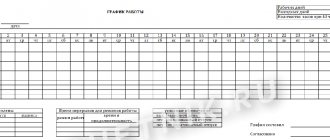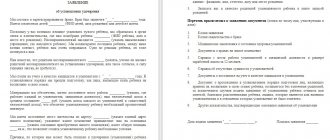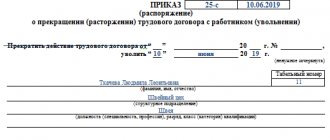Our editor received a letter with a question about working on a “every three days” schedule. A reader asked how long a shift should be - after all, you can’t work 24 hours without lunch? Indeed, some organizations require workers who will work around the clock - security guards, salespeople, etc. And of course, it is necessary to properly organize the work process for them so that the norms of labor legislation are observed. Can a shift last 24 hours or does it need to deduct lunch time? Which accounting period is best for this mode of operation? Do I need to draw up schedules and introduce them to them a month before the introduction? What is the peculiarity of remuneration when working “in three days”? You will get answers to these and some other questions by reading the article.
What is a daily work schedule
Daily work is usually called the performance by an employee of his labor duties continuously for 24 hours in accordance with the internal labor regulations (ILR) and the terms of the employment contract.
The concept of “daily work” is not defined in the Labor Code of the Russian Federation. However, in practice, employers often have to organize. such work. Employees of the Ministry of Emergency Situations, doctors, security guards, and workers of other professions can work on daily schedules.
In order to legally organize work in a company on a daily schedule, you must comply with the following requirements (Article 91, Article 103, Article 110 of the Labor Code of the Russian Federation):
All three conditions must be met simultaneously, otherwise the establishment of such an operating mode will be unlawful. The rights of workers should not be violated when working on daily schedules.
Neglect of these rules can lead to fatigue, depression and illness, which will inevitably affect the productivity of employees and the efficiency of the company as a whole. Violations committed by the employer when organizing daily work and drawing up a schedule may result in fines for him.
The requirement that the duration of rest between shifts should be twice as long as the duration of work, established by clause 10.24 SP 2.2.2.1327-03. 2.2.2. “Occupational hygiene...” is not applied from 2021 due to the abolition of these sanitary and epidemiological rules by Decree of the Government of the Russian Federation of October 8, 2020 No. 1631.
Find out further what else an employer needs to remember when engaging employees to work on daily schedules.
Briefly about the position of “caretaker”.
The possibility of using the position of a watchman in institutions is provided for by the All-Russian Classification of Worker Occupations, Employee Positions and Tariff Classes OK 016‑94, adopted and put into effect by Resolution of the State Standard of the Russian Federation dated December 26, 1994 No. 367.
In the Tariff and Qualification Characteristics for industry-wide professions of workers, approved by Resolution of the Ministry of Labor of the Russian Federation of November 10, 1992 No. 31, intended to establish the categories of workers, the following job responsibilities are defined for the position of “watchman”:
a) checking the integrity of the protected facility (locks and other locking devices), the presence of seals, fire-fighting equipment, serviceability of alarms, telephones, lighting together with a representative of the administration or a shift watchman;
b) if malfunctions are identified (the presence of broken doors, windows, locks, the absence of seals and seals, etc.) that do not allow the object to be accepted under protection - a report about this to the person to whom he is subordinate, a representative of the administration and the officer on duty at the police department, protection of traces crimes before the arrival of police representatives;
c) if a fire occurs at the facility - raising the alarm, notifying the fire brigade and the police officer on duty, taking measures to extinguish the fire;
d) when on duty at the entrance of an institution:
- admission of employees, visitors, vehicles to the territory of the institution and back upon presentation of the relevant documents;
- reconciliation of relevant documents with the actual availability of cargo;
- opening and closing gates;
- reception and delivery of duty with the corresponding entry in the journal;
- maintaining the entrance area in proper sanitary condition.
The watchman must know:
- regulations and instructions on access control;
- sample signatures of persons entitled to sign passes for the removal and export of material assets or visit an institution;
- samples of permanent and one-time passes;
- rules and instructions for the protection of objects;
- boundaries of the protected object;
- telephone numbers of representatives of the administration of the protected facility and the officer on duty at the police department.
Work in the “guard” profession must be performed by employees specified in the establishment’s staffing table.
How to set a daily work schedule for an employee
If you decide to introduce a daily work schedule in your company, you should register such a schedule in the PVTR. Or in an employment contract with an employee, if this schedule is individual or your company is a micro-enterprise that refused to accept local acts.
The text of the PVTR and/or employment contract should indicate (part 1 of article 100, part 2 of article 103 of the Labor Code of the Russian Federation):
- length of the working week and shift;
- alternating working days and weekends;
- start and end of shift;
- time of breaks during the shift (for meals, rest, etc.);
- indication of one shift per day.
Then draw up a shift schedule taking into account the legal requirements described in the previous part of the material.
Shift schedules must be brought to the attention of employees no later than one month before they come into effect (Article 103 of the Labor Code of the Russian Federation).
The right to sleep on a given schedule
It is necessary to take into account the provisions of Articles 106 and 107 of the Labor Code of the Russian Federation, which state that the time spent by an employee on rest and eating is not considered a break. For this reason, a citizen does not have the right to use this period of time at his own discretion. If the organization cannot arrange a break for the person to eat or rest, then this time is subject to payment.
Which employees cannot be transferred to a daily work schedule?
For most workers, any shift duration can be set, including daily (part 1 of Article 93, part 1 of Article 100, part 1 of Article 103 of the Labor Code of the Russian Federation). But certain categories of employees have restrictions on the permissible duration of daily work (Rostrud Letter No. 3567-6-1 dated December 2, 2009). For example, the maximum duration of a disabled employee’s shift is determined by a medical report (paragraph 4, part 1, article 94 of the Labor Code of the Russian Federation).
Therefore, before including workers in the daily work schedule, check whether labor legislation allows a particular employee to be involved in shift work lasting 24 hours (days), and whether he is prohibited from working at night.
In particular, it is impossible to involve pregnant women, minors (except for those who participate in the creation and/or performance of artistic works), workers engaged in work with harmful and/or dangerous working conditions, where short working hours are established, for daily work. and some other categories of workers (Article 92, Article 94, Article 96 of the Labor Code of the Russian Federation).
How to create a daily work schedule
Let's show with an example how to create a daily work schedule.
Example
Initial data: operating mode ─ every other day, accounting period ─ month, standard working hours in July 2021 ─ 176 hours.
The actual time worked is calculated based on the length of the shift (24 hours) and the number of shifts per month. For example, with eight shifts per month, this time will be 192 hours (24 hours x 8 shifts), and overtime is 16 hours. (192 hours – 176 hours).
Sample daily work schedule
Payment for night hours
When a person’s work schedule is established every other day, this indicates that part of such a shift falls at night. It may also be that a citizen works at night on holidays or non-working days. Then you need to understand how payment for such days is made.
It is established by law that when performing work duties at night, payment is made in an increased amount. This rule is spelled out in the provisions of Article 154 of the Labor Code of the Russian Federation. The minimum amount of increase in this situation has been established. It is 1/5 of what you earn on a normal day.
In an individual case, provisions for increased pay at night should be reflected in the collective agreement. Also, this information can be included in local standards, which are adopted taking into account the opinion of the organization’s trade union.
To understand the amount of payment, you need to give a specific example. Citizen Petrov works on a 24/7 basis. At the same time, his salary is 35 thousand rubles. There are 2 rest periods during the work shift, each equal to an hour. The surcharge is 25%.
The standards for hours worked are based on the fact that the work week is 40 hours. It is necessary to calculate the level of earnings for September, provided that this month Petrov worked all the shifts noted in the schedule. It turns out that in September the citizen worked 10 shifts of 22 hours each, for a total of 220. Of these, 110 were night hours. The calculation is based on the following indicators:
- hourly rate is 208.3 rubles
- surcharge for night work: 208.3 *25%*110= 5728.25 rubles
Based on the total for September, Petrov will receive 35,000 + 5728.25 = 40728.25 rubles.
Work during non-working hours or holidays is paid using a double tariff.
If a citizen has overtime work during the month worked, then payment is made at an increased rate. At the same time, the legislator sets the minimum amount of payment. The first couple of hours you need to pay 1.5 times the amount. The rest of the time is paid at double rates.
Summarized accounting of working hours with a daily work schedule
As a general rule, the normal length of the working week cannot exceed 40 hours per week (Part 2 of Article 91 of the Labor Code of the Russian Federation). According to the daily schedule, employees may not work up to standard in one month, but overwork in another month. In this regard, employers use summarized recording of the working time of employees working on a daily work schedule.
Summarized working time tracking allows you to:
- implement a schedule of the duration of the working day and working week on average for the accounting period;
- balance underwork or overtime in such a way that the sum of hours worked during this period is equal to the standard hours for this period for this category of workers.
The accounting period cannot exceed one year, and for recording the working time of workers engaged in work with harmful and (or) dangerous working conditions - 3 months (Part 1 of Article 104 of the Labor Code of the Russian Federation).
The procedure for calculating the norm of working time for certain calendar periods of time (month, quarter, year) depending on the established duration of working time per week is approved by Order of the Ministry of Health and Social Development of the Russian Federation dated August 13, 2009 No. 588N.
Organizing summary recording of working time is a right, not an obligation of the employer. Therefore, he can use regular (non-summarized) working time recording for employees working on a daily schedule (Part 1, Part 4 of Article 104 of the Labor Code of the Russian Federation).
Special breaks
Workers may be given special breaks due to the technology and organization of production and labor (Article 109 of the Labor Code of the Russian Federation). The types of such work, the duration and procedure for providing special breaks are established by the PVTR.
If employees are forced to work outdoors during the cold season or in closed, unheated rooms, as well as in other necessary cases, special breaks are provided for heating and rest.
At the same time, the employer is obliged not only to equip premises for heating and rest of employees, but also to include special breaks during the employee’s working hours (Rostrud Letter No. PG/2181-6-1 dated April 11, 2012).
How to pay for work on a daily schedule
For employees working on a daily schedule, you can establish any wage system: time-based, piece-rate, etc. There are no special instructions or prohibitions in this regard in labor legislation.
Payment is made for actual hours worked or volume of work completed. For night work, it is necessary to pay extra for each hour of night time at least 20% of the salary/hourly rate (Article 154 of the Labor Code of the Russian Federation, Decree of the Government of the Russian Federation of July 22, 2008 No. 554). Holidays on which a scheduled shift falls are paid at no less than double rate or single rate if the employee takes time off for a “holiday” shift (Part 3 of Article 153 of the Labor Code of the Russian Federation).
We will separately dwell on the procedure for paying for deficiencies and overtime of employees formed at the end of the accounting period.
When paying for defects, it is necessary to take into account the provisions of Art. 155 Labor Code of the Russian Federation:
If an employee has worked more than the established hours at the end of the accounting period, he or she will be overtimed. It should be paid as overtime:
- for the first 2 hours - at least one and a half times the amount, and if this work has already been paid in a single amount when paying wages, then you need to pay at least up to one and a half times the amount;
- subsequent hours - at least double the amount, and if they are already paid for in a single amount, you should pay at least up to double the amount.
At the employee’s request, he can take time off for overtime hours: no less than the time worked overtime (Part 1 of Article 99, Part 1 of Article 152 of the Labor Code of the Russian Federation, Letter of the Ministry of Health and Social Development dated August 31, 2009 No. 22-2-3363).
In order not to make a mistake in calculating and paying overtime, it is important for the employer to pay attention (Parts 6 and 7 of Article 99 of the Labor Code of the Russian Federation):
- to scrupulously count the overtime of each employee;
- control over the volume of overtime ─ per year, overtime work should not exceed 120 hours (Part 6 of Article 99 of the Labor Code of the Russian Federation).
Work on weekends and holidays does not apply to overtime (Part 3 of Article 152 of the Labor Code of the Russian Federation).
When calculating hours of overtime and underwork, it should be taken into account that the standard hours for different employees for the accounting period may differ. The standard hours exclude the time when the employee did not work, but he retained his place of work - he was on vacation or on sick leave, or underwent a medical examination. In such cases, the employee’s standard working time must be reduced by the number of hours of such absence falling within working hours (Letter of the Ministry of Labor dated May 21, 2019 No. 14-2/OOG-3606).
If you have any unresolved questions, you can find answers to them in ConsultantPlus.
Full and free access to the system for 2 days.
Doctors on duty
04.05.2018
Doctors' shifts The night shifts of doctors and nurses are a matter of dispute in many medical institutions. Not all health workers understand the legality of involving them in work at night. Let's consider the legal features of doctors' night shifts, their payment, the rules for calculating rest and work time, as well as other points. Night duty for doctors: concept At the moment, a clear concept of night duty, as well as a doctor on duty, is not formulated in labor legislation. However, a number of regulations contain reference to the doctor on duty:
- The Federal Law “On the Protection of Citizens’ Health” states that the doctor on duty makes decisions on medical intervention in relation to patients without his consent or the consent of his legal representatives in prescribed cases.
- The provisions of the Civil Code of the Russian Federation give the doctor on duty the right to certify citizens’ powers of attorney if necessary. This is provided for in Art. 1127 of the Civil Code of the Russian Federation, which states that certification of powers of attorney for patients by doctors on duty at medical institutions is equivalent to a notarized power of attorney.
The procedures for providing a specific type of medical care specify the responsibilities of doctors on duty and the specifics of their decision-making on prescribing medications and procedures. First of all, night duty of doctors is necessary in a medical institution that continuously provides medical services to citizens, for example, various hospitals (24-hour, daytime in two shifts, weekends). Working hours of the doctor on duty The duty of medical workers is always associated with the duration of their working hours. In accordance with the provisions of labor legislation, the following components are included in the concept of working hours:
- working week duration regime – number of working and non-working days;
- duration of daily stay at work (shift);
- start and duration of the working day;
- rest time during the working day and breaks during it.
The duration of all these components of work is established by orders of the chief physician of the hospital. When drawing up work schedules for employees, the opinion of the health workers' union should be taken into account. Thus, the work schedule of the doctor on duty represents his working time, distributed over a certain period of reporting time. In accordance with local acts of the medical organization and the rules of labor legislation, during this time the doctor must fulfill his professional duties. It should be remembered that health workers are entitled to reduced working hours, which cannot exceed on the basis of Art. 350 Labor Code of the Russian Federation 39 hours a week. The length of each employee's shift or working day is determined by the employee's specific position and profession. For employees living in rural areas, extended part-time working hours may be established in accordance with Decree of the Government of the Russian Federation No. 813 of November 12, 2002. Shift work and night shifts of doctors Nursing staff, as well as orderlies, usually work certain shifts according to a daily schedule, for example, three people go on a shift for a day and rest. Medical personnel usually work in the department during the day, and according to a monthly schedule they go on night duty. In this case, we are talking about shift work in a department of a medical institution. As established by the Labor Code of the Russian Federation, shift work is such when the duration of the work process exceeds the duration of the work of medical staff. By establishing a shift work schedule, medical equipment is used more efficiently and the volume of medical services provided increases. In this case, the shift mode can be implemented in two, three, four shifts. Time of night duty The duty of medical workers is considered night duty if it began at 17:00 or later and ended at 8:00 am the next day. Day duty can last until 6 pm. Since the daily duty of health workers often falls on holidays and weekends, some clarification is necessary. Night time lasts from 10 pm and ends at 6 am. The current document is the USSR Ministry of Health - letter No. 02-19/21 dated December 11, 1954, which states that in the evening and at night, available medical staff of full-time specialists work with patients, taking into account the working hours established at the main place of work and part-time. At the same time, work hours in the evening and at night must be taken into account in the monthly duty schedule of doctors, which is approved by the chief physician of the medical institution. Sleep during night duty One of the most controversial issues related to the night work of doctors is sleep during night duty. Very often, the management of a medical institution applies disciplinary sanctions to its medical staff for resting or sleeping during night work. In this regard, health workers often ask higher-level departments who exactly has the right to rest during night duty and how long it should last. As established by the already mentioned letter of the USSR Ministry of Health No. 02-19/21 dated December 11, 1954, medical workers can be assigned a night shift with the possibility of sleeping. However, there are some exceptions:
- medical personnel who provide emergency therapeutic, surgical and gynecological care to the population;
- medical staff of maternity wards, surgical wards, psychiatric and infectious diseases wards.
Junior hospital staff are not allowed to work with the ability to sleep during night duty. Therefore, it is recommended that local regulations of a particular medical institution and its divisions specify which categories of health workers have the right to sleep during night duty and at what time. Duty at home of medical workers With the consent of a health worker, he may be assigned to duty at home in order to provide urgent and emergency care to the population. At the same time, the medical employee may remain at home during the entire period of duty, with the exception of calls for emergency and emergency calls. When a health worker is on duty at home, his working time is counted as follows: every hour of time during which the worker is on duty at home is considered ½ hour of working time. Moreover, the total duration of such duty cannot exceed the monthly norm of a health worker for the corresponding period. Rest of an employee during the period of duty During the shift or duty of the employee, he must be given a time for rest. So, in accordance with Art. 108 of the Labor Code of the Russian Federation, he should be given from 30 minutes to 2 hours of rest. During this time, the employee is considered free from performing his job duties. The specific duration of rest time should be fixed in the local regulations of the hospital. In accordance with the rules established by the Labor Code of the Russian Federation, all employees are provided with days off, which constitute a continuous weekly rest. For example, if an employee has a five-day work week, he is given two days off. The general day off for everyone is Sunday. If a medical institution does not have the opportunity to stop work on weekends for certain reasons, for example, in connection with medical procedures for hospitalized patients, then employees are given days off on different days of the week by agreement with the employee. They are reflected in the shift schedule. For example, an employee can work one day and rest three days. These will be his days off. Certain categories of employees cannot be assigned to night duty:
- minor employees;
- pregnant women;
- with written consent - women with children under three years of age and with disabled children, employees caring for sick relatives, single parents raising children under 5 years of age;
- employees with disabilities are also allowed to work at night only if they have a medical certificate about this possibility and written consent.
Payment for duty of medical workers The Labor Code of the Russian Federation regulates the procedure for remuneration of employees who work at night, as well as on weekends and holidays. Decree of the Government of the Russian Federation No. 554 of July 22, 2008 is devoted to the issue of payment for medical workers on duty at night. Please note that the procedure for paying doctors for duty must be established by the remuneration system in force in this organization (in accordance with the requirements of Article 144 of the Labor Code of the Russian Federation). At the same time, in accordance with Part 2 of Art. 154 of the Labor Code of the Russian Federation, payment for the “night part” of daily duty (time from 22 o’clock to 6 o’clock, in accordance with Article 96 of the Labor Code of the Russian Federation) should be set at an increased rate. The minimum increase in wages for work at night (from 10 p.m. to 6 a.m.) is 20% of the hourly tariff rate (salary (official salary) calculated per hour of work) for each hour of work at night (Resolution of the Government of the Russian Federation dated July 22 2008 No. 554). The specific amounts of increased wages for work at night are established by a collective agreement, a local regulatory act adopted taking into account the opinion of the representative body of workers, and an employment contract (Part 3 of Article 154 of the Labor Code of the Russian Federation). We also draw your attention to the fact that if, according to the schedule, the shift falls on a holiday, then it must be paid at an increased rate, according to the norms of Art. 153 of the Labor Code of the Russian Federation, taking into account whether the hours worked on a holiday fall within the norm in the current month or exceed it (as follows from Explanation No. 13/P-21, approved by Resolution of the State Committee for Labor of the USSR, Presidium of the All-Union Central Council of Trade Unions dated August 8, 1966 No. 465/P-21, and the Decision of the Supreme Court of the Russian Federation of November 30, 2005 No. GKPI05-1341). Moreover, payment is made to all employees for the hours actually worked on the holiday. When part of a work shift falls on a holiday, the hours actually worked on the holiday (from 0 hours to 24 hours) are paid at double the rate. According to Part 2 of Art. 153 of the Labor Code of the Russian Federation, specific amounts of payment for work on a day off or a non-working holiday can be established by a collective agreement, a local regulatory act adopted taking into account the opinion of the representative body of workers, an employment contract (but not less than the amounts guaranteed by current labor legislation). Please note that hours of work at night on holidays are paid both as night hours (in accordance with Article 154 of the Labor Code of the Russian Federation) and as holidays (in accordance with Article 153 of the Labor Code of the Russian Federation). Article 154 of the Labor Code of the Russian Federation does not contain additional conditions for establishing increased pay for night work, in particular, that only night hours worked during working hours are paid at an increased rate. Accordingly, the norms of Art. 154 of the Labor Code of the Russian Federation applies to any night work performed both during working hours and outside it (overtime, on weekends and holidays). The dependence of the amount of pay for duty on the bed capacity can only be if the wage system in the organization establishes certain standards for the workload for workers, in this case, the additional payment will be due to the excess of the workload standards (volume of work), and the specific amounts of the additional payment can only be established by the system remuneration for this organization. Duties of medical workers Medical workers can perform duty functions not only according to the schedule, but also outside the normal working hours. The Labor Code of the Russian Federation states that both the main labor function of the employee and the additional work performed by him must be reflected in the employment contract and be formalized as part-time work or a combination of positions. Peculiarities of attracting health workers to duty The duties of health workers are of a specific nature, therefore payment for duty must be included in the average earnings. All functions that a medical worker performs while on duty must be specified in the job description and employment contract. But it is worth paying attention to the fact that no matter what additional work a health worker has to do, it can only be done with his voluntary consent, as specified in the Labor Code of the Russian Federation. For example, doctors of outpatient departments of hospitals, dispensaries, and maternity hospitals can be involved in duty in hospitals only with their voluntary consent or if such functions are provided for by their duties. If the inpatient department is the place of work of a medical worker, then the performance of functions during night shifts (the Labor Code of the Russian Federation clearly states this) should be reflected in his job responsibilities. The head of a medical institution has the authority to approve the workload norm for an employee of an organization under his control. How time on duty at home is recorded In order to implement the program of state guarantees of free provision of emergency and urgent medical care to citizens, medical workers can be on duty at home, however, as in all other cases, this can only happen with their consent. If a medical worker agrees to be on duty at home, that is, to wait for a call to provide emergency or urgent medical care, then the time of such duty is paid in the amount of ½ hour of working time for each hour of such duty. It is worth noting that the duration of working hours, taking into account the duty of a medical worker at home, should be equal to the standard time of a medical worker for the corresponding period. The internal labor regulations establish a summarized accounting of the working time of those health workers who are on duty at home. The work schedule for home duty includes the start and end times of the medical worker's duty. The schedule is approved by the employer, however, the opinion of the representative body of employees must be taken into account. When calling a medical professional on duty at home to provide emergency or emergency care, not only the time spent providing medical care is taken into account, but also the time spent traveling to the place of call and back. Accounting is made in the amount of 1 hour of working time for each hour of medical care and follow-up. During the accounting period, the time on duty at home must be adjusted so that its total duration does not exceed the standard working time of a health worker for the corresponding period. The recording of travel time from home to the place of call and back is carried out in accordance with local regulations and on the basis of agreement with the representative body of workers. Each employer is required to keep records of the time a medical worker is on duty at home, the length of medical care provided, and the travel time from home to the place of work and back in the event of a call. For example, the reduced working hours of one of the doctors are 39 hours a week. His work schedule at the hospital where he works includes 29 hours a week of medical care and 20 hours a week of home duty. The total working time is 49 hours per week. It is worth noting that the 20 hours allocated for duty at home are counted as half an hour for each hour of duty (including night shifts; this point is also spelled out in the labor code). As a result, the working time is thirty-nine hours, that is, it corresponds to the standard time of a medical worker for the corresponding period. Results of applying the norm of Article 350 of the Labor Code of the Russian Federation If we talk about the real time of duty at home, it is worth noting that any health worker, carrying out this type of duty, actually works in an extended day. And this, of course, contradicts the norms of the Labor Code of the Russian Federation. Therefore, most often, employees engage in such activities without much desire, which contributes to the emergence of a tense psychological climate in the team. As a result of monitoring carried out by the Central Committee of the Health Workers Trade Union in order to study the state of affairs regarding the implementation of Art. 350 of the Labor Code of Russia regarding the implementation of duty at home, it was revealed that, as a result of the lack of staff positions, carrying out duty at home within the established working hours is a big problem, sometimes even unsolvable. After all, insufficient staffing often leads to the fact that for some specialists such duty turns into round-the-clock duty. A big disadvantage of the work-at-home system is that duty is carried out outside working hours, for which payment is made either for overtime work, or for part-time work, or in the form of compensation payments. Art. 99 of the Labor Code of the Russian Federation provides for restrictions on attracting workers to overtime work - no more than 120 hours, however, in practice, the time spent on duty at home significantly exceeds the established norm. Payment for night duty at home for medical workers Payment for night duty at home for doctors has its own characteristics, for example:
- the calculation of payment for duty at home is at least 20% of the hourly tariff rate of salary calculated per hour of work, for each hour of work at night, or in accordance with the terms of the local regulatory act of the medical organization and the employment contract;
- time on duty at home is taken into account in the amount of one-half hour of working time for each hour of duty at home;
- are paid for night shifts ( this is described in more detail in the Labor Code, Art. 154) at an increased rate compared to work under normal conditions;
- the amount of payment should not be lower than the amount established by the Labor Code of the Russian Federation or other regulatory documents;
- The minimum increase in night duty pay is equal to twenty percent of the hourly tariff rate for each hour of work at night.
Article 94 of the Labor Code of the Russian Federation establishes the duration of the night shift - from 22:00 to 06:00, which means that medical workers on duty at home at night are paid for exactly this time. The calculation takes into account the minimum increase in wages for night work - 20 percent of the salary calculated per hour of work.
How to pay for an emergency call to a doctor at night and on a holiday
Quite often situations arise when it is necessary to urgently involve a doctor in work on a weekend, holiday or at night. Before the Labor Code of the Russian Federation determines that work on a weekend or holiday is paid in addition to the salary as a double daily or hourly rate (part of the salary/official salary for a day or hour of work). Also, Article 135 of the Labor Code of the Russian Federation specifies that this must be done if the work was completed in excess of the monthly working hours. Payment for work on a day off can be set higher than the double rate, but not lower. Specific amounts of payment are specified in the collective agreement, local regulations (taking into account the opinion of the trade union) and the employment contract (effective contract). The Regulations on Remuneration may establish that work on a weekend and/or holiday is paid taking into account compensation and incentive payments provided for by the remuneration system of a particular medical organization. Overtime work on a holiday is paid only as work on a holiday. There is no need to count it as overtime (Resolution of the USSR State Committee for Labor, the Presidium of the All-Union Central Council of Trade Unions dated August 8, 1966 No. 465/P-21). To get an employee to work on a weekend or holiday:
- issue an order for employment;
- inform the employee of the right to refuse work;
- obtain the employee’s written consent to work on a weekend or holiday;
- take into account the opinion of the trade union.
Such rules were established by Article 113 of the Labor Code of the Russian Federation.
Is it necessary to pay for work at night if the employee has an irregular working day? Yes need. Irregular working hours are a special mode of work. Under this regime, individual employees can be involved in performing their work functions beyond the working hours established for them. This happens sporadically, by order of the employer. The list of positions of employees with irregular working hours is established in the collective agreement, agreements or local regulations of the organization. This procedure was established by Article 101 of the Labor Code of the Russian Federation. As a general rule, work in irregular working hours is compensated to the employee by additional paid leave (Articles 116, 119 of the Labor Code of the Russian Federation). The duration of such leave must also be determined in the collective agreement or the organization’s labor regulations (but not less than three calendar days). At the same time, an employee’s work in conditions that differ from normal conditions should also be compensated, but in monetary terms. The list of working conditions that are considered different from normal includes, among other things, the employee performing a labor function at night (Article 149 of the Labor Code of the Russian Federation). Employees who work irregular working hours are subject to all the guarantees of labor legislation. Therefore, pay for work at night at a higher rate, just like other employees (Part 1 of Article 154 of the Labor Code of the Russian Federation). Thus, if you hire an employee who has been assigned irregular working hours to work at night, provide him with:
- additional paid leave for irregular working hours;
- increased wages (compared to daytime work) for each hour of work from 10 p.m. to 6 a.m.
Similar conclusions follow from Rostrud’s letter dated June 25, 2012 No. 929-6-1.
How many years to keep the daily schedule
The storage periods for work schedules are established in clause 402 of the List of standard management archival documents, approved. By Order of Rosarkhiv dated December 20, 2019 No. 236:
| 402. | Time sheets (schedules), working time logs | 5 years | Under harmful and dangerous working conditions – 50/75 years |
The daily schedule of employees with harmful and/or dangerous working conditions must be stored:
- 50 years if it is completed by office work after 01/01/2003;
- 75 years if it was completed before 01/01/2003.
The storage period of the schedule must be calculated from January 1 of the year following the year in which the schedule ended (Part 1, Article 17, Article 21.1 of the Federal Law “On Archiving in the Russian Federation” dated October 22, 2004 No. 125-FZ, clause 4.1 and clause 4.8 of the Instructions, approved by Order of the Federal Archive of December 20, 2019 No. 237, Letter of the Federal Archive of March 13, 2020 No. R/M-479).
What can an employer be punished for?
The employer should take the registration of work on a daily schedule seriously, as well as compliance with the procedure for remuneration according to such a schedule. Otherwise, administrative liability may follow under Parts 4 and 5 of Art. 5.27 Code of Administrative Offenses of the Russian Federation. For example, they may be punished for failure to pay for deficiencies due to the employer’s fault or for paying for work on a daily schedule late/not in full.
If an employer, in an employment contract with an employee who works on a daily schedule, does not specify the working hours and rest hours, when they differ from the general rules of work in the company, he may be brought to administrative liability under Parts 4 and 5 of Art. 5.27 Code of Administrative Offenses of the Russian Federation.
They may also be punished for the lack of a daily schedule, if such a work schedule is established in the company, or for any violation of the procedure for drawing up a schedule (under Parts 1, 2 of Article 5.27 of the Code of Administrative Offenses of the Russian Federation).
Administrative responsibility under Art. 13.20 of the Code of Administrative Offenses of the Russian Federation may threaten an employer who violates the rules for storing the daily schedule.
Let's sum it up
- The daily work schedule involves the employee performing his or her job duties continuously for 24 hours in accordance with the internal labor regulations and the terms of the employment contract.
- To ensure that work in this mode does not violate the norms of labor legislation, the employer must simultaneously fulfill three conditions regarding the duration of working hours and rest time.
- It is prohibited to include pregnant women, minors and some other categories of persons in daily schedules.
- Payment for work on a daily schedule should take into account the time actually worked by the employee, as well as additional payments for work at night, holidays, etc.








